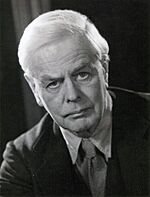Chatham House facts for kids
 |
|
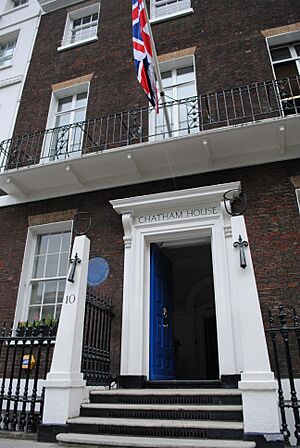
Entrance to Chatham House in 2012
|
|
| Established | 1920 |
|---|---|
| Headquarters | 10 St James's Square London, England |
|
Membership
|
6,000 (approx.) |
|
Formerly called
|
The British Institute of International Affairs |
Chatham House, also known as The Royal Institute of International Affairs, is a special group in London, England. It is like a "think tank", which means it is a place where experts think deeply about big world problems. Its main goal is to help countries and people work together. They want to build a world that is safe, successful, and fair for everyone.
Chatham House is famous for something called the Chatham House Rule. This rule helps people talk openly about difficult topics. The main building for Chatham House is at 10 St James's Square in central London. This building is very old and beautiful. It was once home to three British prime ministers. In 1923, a kind Canadian family, Reuben Wells Leonard and Kate Rowlands Leonard, bought the building. They gave it to the institute to use as its home. That is why the institute is often called Chatham House.
Chatham House has many members. These members can be individuals or groups. They come from businesses, universities, and other organizations.
Contents
What is the Chatham House Rule?
The Chatham House Rule is a special rule that started at Chatham House. It helps people have honest discussions. Here is how it works:
- You can talk about what was said in a meeting.
- But you cannot say who said it.
- You also cannot say who was at the meeting.
This rule helps people feel safe to share their ideas. They can talk about tricky or unpopular topics without worrying about being judged outside the meeting. This helps them find new solutions to problems. Most meetings at Chatham House are open to the public. But some important discussions use this rule.
How Chatham House Helps the World
Chatham House does a lot of important work. They study many different topics to help leaders make good decisions.
Research and Publications
Chatham House has experts who research many areas. These include:
- The environment and society.
- The global economy and money.
- Health safety around the world.
- International laws.
- World security.
They also study different parts of the world. These include Africa, Asia, Europe, the Middle East, Russia, the USA, and the UK.
Chatham House also has a special group called the Sustainability Accelerator. This group looks at how we use Earth's resources. They want to find ways to use them wisely for the future.
Many important people from around the world visit Chatham House. They come to share their ideas and talk about big issues.
Chatham House also publishes magazines and journals. These include:
- International Affairs (since 1922).
- Journal of Cyber Policy (since 2016).
- The World Today (since 1945). These publications share their research with people everywhere.
The History of Chatham House
Chatham House has a long and interesting history. It started after a very important event.
How it Started
Chatham House began in 1919. This was after World War I. Experts from Britain and America met in Paris to discuss peace. One person, Lionel Curtis, thought it was a great idea to keep these discussions going. He believed that experts should continue to study world problems together.
So, the British and American groups decided to form their own institutes. The American group started the Council on Foreign Relations in New York City. The British group started what would become Chatham House.
The first meeting of the British Institute of International Affairs was in 1920. Important leaders like Robert Cecil and Edward Grey were there. They agreed to create an institute to study international questions.
By 1922, the institute needed a bigger home. That is when Colonel R. W. Leonard gave them Chatham House at 10 St. James's Square. This is where the institute is still located today.
Growing in the Early Years
After it started, Chatham House quickly became very active. The journal International Affairs began in 1922. This helped share their ideas around the world.
A professor named Arnold Toynbee wrote an annual "Survey of International Affairs." This book looked at world events each year. It helped people understand what was happening in international relations.
In 1926, Chatham House members went to a conference about the Pacific region. This helped them learn more about countries like China. In the same year, the institute received a special honor from the King. It became "The Royal Institute of International Affairs." This meant it was officially recognized for its important work.
Expanding and Influencing
In 1929, Ivison Macadam became the first full-time director. He helped the institute grow a lot. They got more buildings and space for their work.
Chatham House also studied big economic problems. For example, they looked at the "international gold problem." Famous economists like John Maynard Keynes were part of this study. Their work helped Britain make important financial decisions later on.
Many world leaders visited Chatham House. Mahatma Gandhi gave a talk there in 1931. About 750 people came to listen! In 1933, Norman Angell, who worked with Chatham House, won the Nobel Peace Prize. He won it for his book The Great Illusion.
Chatham House also started the Commonwealth Relations Conference in Canada in 1933. This was a place for leaders from different countries to talk about world politics.
During World War II
When World War II started, Chatham House moved some of its staff to Balliol College, Oxford for safety. There, they worked closely with the government. They helped by studying foreign newspapers and providing important information about the war. Many historians helped with this effort.
After the war, Chatham House helped with rebuilding the world. Many of its members went on to work for new international groups. These included the United Nations and the International Monetary Fund.
After the War
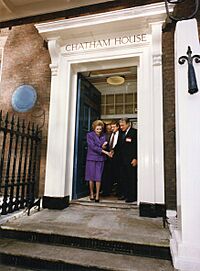
After World War II, Chatham House studied how Britain and the Commonwealth were changing. They looked at countries becoming independent. They also studied the Cold War.
In 1953, they started a group to study race relations. This group later became its own charity, the Institute of Race Relations.
Chatham House also focused on Latin America. Che Guevara, a leader from Cuba, even wrote an article for their journal in 1964.
During the Cold War, Chatham House helped improve relations between Britain and the Soviet Union. They held special meetings to encourage talking and understanding.
In the 1980s, Chatham House started new research programs. These included studies on energy and the world economy. They also worked to build stronger connections with other countries, like Japan.
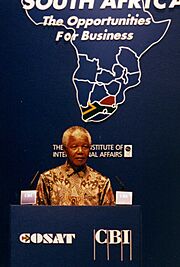
Chatham House in the 21st Century
In 1998, Chatham House started the Angola Forum. This helped discuss the future of Angola. In 2002, they created their Africa Programme.
In 2005, Chatham House started the Chatham House Prize. This award honors leaders and groups who make a big difference in international relations. Queen Elizabeth II gave the first award to the President of Ukraine.
In 2013, Chatham House launched the Queen Elizabeth II Academy for Leadership in International Affairs. This academy helps train future world leaders. It gives them a chance to learn and grow at the institute.
In 2020, Chatham House celebrated its 100th birthday! They had many events and honored people like Sir David Attenborough and Greta Thunberg.
In April 2022, Russia called Chatham House an "undesirable organization."
Recent Reports
Chatham House publishes many important reports. Here are some examples:
- In 2015, they wrote about how reducing meat consumption can help with climate change. They also looked at how to provide energy for refugees.
- In 2016, they studied how leaders in Latin America and former Soviet countries view the United States.
- In 2017, they explored Ukraine's fight to be an independent country. They also looked at how to make global food trade safer.
- In 2018, reports discussed the relationship between Europe and the US. They also looked at how to make cement production more eco-friendly. Another report discussed how to manage AI as it grows.
- In 2019, they wrote about strengthening the relationship between the UK and Japan. They also studied the economic reasons behind conflicts in the Middle East.
- In 2020 and 2021, they published reports on the costs of poor nutrition for businesses. They also looked at common misunderstandings about Russia.
Leaders of Chatham House
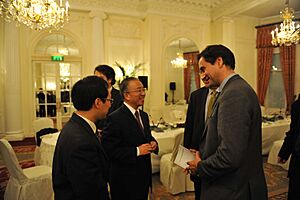
As of 2024, the chairman of Chatham House is Sir Nigel Sheinwald. The director and CEO is Bronwen Maddox. She took over from Sir Robin Niblett in 2022. He had been the director for 15 years.
Chatham House also has three presidents. These are Lord Darling of Roulanish, Baroness Manningham-Buller, and Helen Clark.
How Chatham House is Funded
Chatham House gets money from different groups to do its work. In 2020/2021, some of its biggest supporters were:
- The MAVA Foundation (over £5,000,000).
- The UK Foreign, Commonwealth and Development Office (over £1,000,000).
- The Robert Bosch Stiftung and the Japanese Ministry of Foreign Affairs (between £500,000 and £1,000,000 each).
In November 2022, a website called Who Funds You? looked at Chatham House's funding. They gave it a C grade for how open it is about its money.
The Chatham House Prize
The Chatham House Prize is an award given every year. It celebrates a person or group who has done the most to improve international relations.
Winners of the Prize
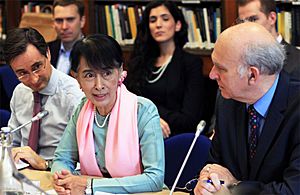
Awards and Recognition
Chatham House has won many awards for its work.
- In November 2016, Prospect magazine named it the "Think-Tank of the Year." It also won awards for its work on international affairs and the environment.
- In 2017, the University of Pennsylvania ranked Chatham House as the "Think Tank of the Year." It was also named the second most important think tank in the world. It was the most important non-U.S. think tank.
What People Say About Chatham House
Chatham House has received some comments and questions. Some people have said that it is mostly run by powerful people. There have also been questions about how open it is about where its money comes from.
The Chatham House Rule has also been discussed. Some people think it makes it harder to know exactly what was said and by whom. This can make it difficult to hold people accountable. Also, some critics have pointed out that Chatham House had links to British imperialism when it first started.
See also
 In Spanish: Chatham House para niños
In Spanish: Chatham House para niños
- Australian Institute of International Affairs
- Canadian International Council
- German Council on Foreign Relations
- International Affairs
- List of think tanks in the United Kingdom
- Netherlands Institute of International Relations Clingendael
- Pakistan Institute of International Affairs
- Singapore Institute of International Affairs
- The World Today
 | Leon Lynch |
 | Milton P. Webster |
 | Ferdinand Smith |


